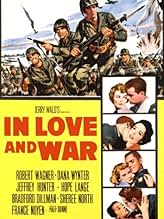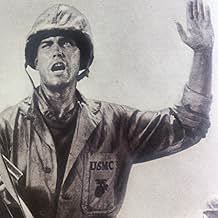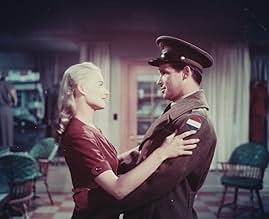In 1944, the family lives of three San Francisco Marines are affected by their personal experiences on the front lines in the Pacific and at home.In 1944, the family lives of three San Francisco Marines are affected by their personal experiences on the front lines in the Pacific and at home.In 1944, the family lives of three San Francisco Marines are affected by their personal experiences on the front lines in the Pacific and at home.
- Awards
- 1 win total
Edit Angold
- Maid
- (uncredited)
Edith Barrett
- Mrs. Lenaine
- (uncredited)
James Bell
- Sidney Lenaine
- (uncredited)
Barry Bernard
- Hotel Clerk
- (uncredited)
Barry Brown
- Minor Role
- (uncredited)
- Director
- Writers
- All cast & crew
- Production, box office & more at IMDbPro
Featured reviews
Anton Myrer's novel, "The Big War," was published in 1957 with some degree of success and, not surprisingly, 20th Century-Fox bought the film rights. After all, World War II movies were a staple of this time and Myrer's novel provided a number of parts for those rising young performers then being groomed by 20th. The novel's three central Marine characters remained in Edward Anhalt's screenplay but their backgrounds were simplified, various supporting characters were eliminated, and the background for the domestic scenes shifted from the East Coast to California. Robert Wagner's back-story remains truest to the book. He has a doting mother and adoring younger siblings but fights with his hateful step-father. Bradford Dillman plays the rich, college-educated Marine and the movie sketches in his background but now gives him a drunken socialite of a fiancée, Dana Wynter, who's largely a screenwriter's invention. (His new girlfriend, France Nuyen, seems to have been inspired by another, unrelated character in the book.) Dillman's fate has also been re-written from Myrer's version. Jeffrey Hunter plays the conscientious Marine with the pregnant wife but his strained relationship with his mother-in-law goes unmentioned in the movie. (He does, however, get a bare-chest scene.) The second half of the movie shifts from homefront scenes in California to battle scenes in the Pacific. These scenes are done in a perfunctory style -- laced with occasional footage from actual World War II photographers -- and the actors' identities sometimes blur in those similar uniforms and under those metallic helmets. The result of all this is a glossy, mildly entertaining, but unmemorable movie which never rises above the "B" level of its "B" level performers. (Acting honors, such as they are, go to Sheree North as a practical-minded WAC.)
About half of the film is all about relationships between three marines and their sweethearts, three very different characters of very different backgrounds, and so are their sweethearts. The second half is dominated by the war in the Pacific, greatly depicting the arduous hardships of the marines and their unimaginable heroic efforts and deeds. You get a very extensive and clear picture of what the war in the Pacific really was like. The three girls encounter the ordinary fates of female civil victims of the war, one is widowed with a child, another sinks down in alcohol and tragedy, and no one gets out of it unscathed, although there is always a continuity. It is beautifully photographed and filmed, and Hugo Friedhofer's music adds to its high quality. This is a film you would like to see again sometime.
I'm easily bothered by films that are set during a certain decade (and now century) with costuming, design, styling, etc., that don't match the period portrayed. If you pay close enough attention, there's very little that's 1940s about this film in its depiction. That being said, it actually was more satisfying than I anticipated.
The first act of this two-act film is clunky in nature. I agree with the reviewer who wrote that Wagner's portrayal of intoxication is well over the top and therefore, at least to me, unconvincing, but there's moments in the second act in which he shows his acting chops. Dillman unsurprisingly does not disappoint, and Hunter delivers a pleasing surprise.
This movie tends to vacillate between hokey, soap-opera elements and cerebral, emotionally intense components. Once you get past the obvious on-set shooting typical of the '50s and the forcing of "topical" issues, such as unwed pregnancy, interracial relationships, and philosophical objection to war, there's a final product that's actually touching.
I'm truly surprised I liked it.
The first act of this two-act film is clunky in nature. I agree with the reviewer who wrote that Wagner's portrayal of intoxication is well over the top and therefore, at least to me, unconvincing, but there's moments in the second act in which he shows his acting chops. Dillman unsurprisingly does not disappoint, and Hunter delivers a pleasing surprise.
This movie tends to vacillate between hokey, soap-opera elements and cerebral, emotionally intense components. Once you get past the obvious on-set shooting typical of the '50s and the forcing of "topical" issues, such as unwed pregnancy, interracial relationships, and philosophical objection to war, there's a final product that's actually touching.
I'm truly surprised I liked it.
10paforten
I grew up during the years of WWII and always enjoy movies made about that time. This movie is exceptionally great. TCM (Turner Classic Movies) shows it now and then. I like the choice of actors/actresses for the parts. Robert Wagner, Bradford Dillman, Jeffrey Hunter and Hope Lang are especially great. I like the scenes of early San Francisco shown in the film. I also think it's a great character study, most of the men in the U.S. felt it was their duty to enlist in the military to avenge our country. The struggle is show in the character of Alan Newcome (Bradford Dillman). And also the expectations put on Alan by his father. Then there is the internal struggle of "Frankie" (Robert Wagner) to measure up to the character of the men he is serving with. Then comes the noble gesture by Jeffrey Hunter's character to "do the right thing," and marry his pregnant girlfriend. I can't seem to find the right words to talk about this great movie, it's so exceptional. See it yourself, I think you'll like the life lessons it has.
Although made in 1958, this is one of those patriotic WWII movies that are a hit with Americans who appreciate the sacrifices made for our freedom. Yet, there was plenty of home front footage as well with very good acting. Dana Wynter, whom I had just seen in Sink The Bismarck, did a wonderful job in a difficult part. The writing for the part was superficial and the reasoning behind it not believable. And yet, Ms. Wynter took it and made it believable. What an actress! And darn good looking too! The male leads were all well done, Jeffrey Hunter, Robert Wagner and Bradford Dillman. One finds oneself rooting for all three Marines to make it through the battle scenes. Hope Lange, a great actress as always and a real beauty. Remember her in the TV version of The Ghost and Mrs. Muir? France Nuyen, a sweet face and good acting, what more could we want? One face popped up that I recognized right away - a Corcoran boy! This one is Brian who played Israel Boone on the old Daniel Boone TV show. But it was his brother Kevin Corcoran whom I thought about - the great child actor who did Old Yeller, Pollyanna and others. His sister in the movie is Veronica Cartwright, the real life sister of Angela Cartwright of the Danny Thomas show, Lost in Space and Brigitta in the Sound of Music movie. Of course Veronica made news herself as Jimima Boone on the same TV show as Brian, Lumpy's sister on Leave It To Beaver, Spencer's Mountain and other good parts. All in all, excellent acting in this movie, good drama and exciting WWII action by the Marines. Well worth seeing.
Did you know
- TriviaFilm debut of Veronica Cartwright.
- GoofsAlthough the film is set during the final days of World War II, which ended in 1945, outside the San Francisco hotel where Jeffrey Hunter and Hope Lange spend their honeymoon are parked, among other vehicles, a 1954 Ford and a 1952 Plymouth; CinemaScope panoramas of San Francisco streets, and the San Francisco skyline are all contemporary 1958 views.
- ConnectionsReferenced in What's My Line?: Robert Wagner (2) (1958)
- How long is In Love and War?Powered by Alexa
Details
- Release date
- Country of origin
- Language
- Also known as
- The Big War
- Filming locations
- Production companies
- See more company credits at IMDbPro
Box office
- Budget
- $1,590,000 (estimated)
- Runtime
- 1h 51m(111 min)
- Aspect ratio
- 2.35 : 1
Contribute to this page
Suggest an edit or add missing content






































